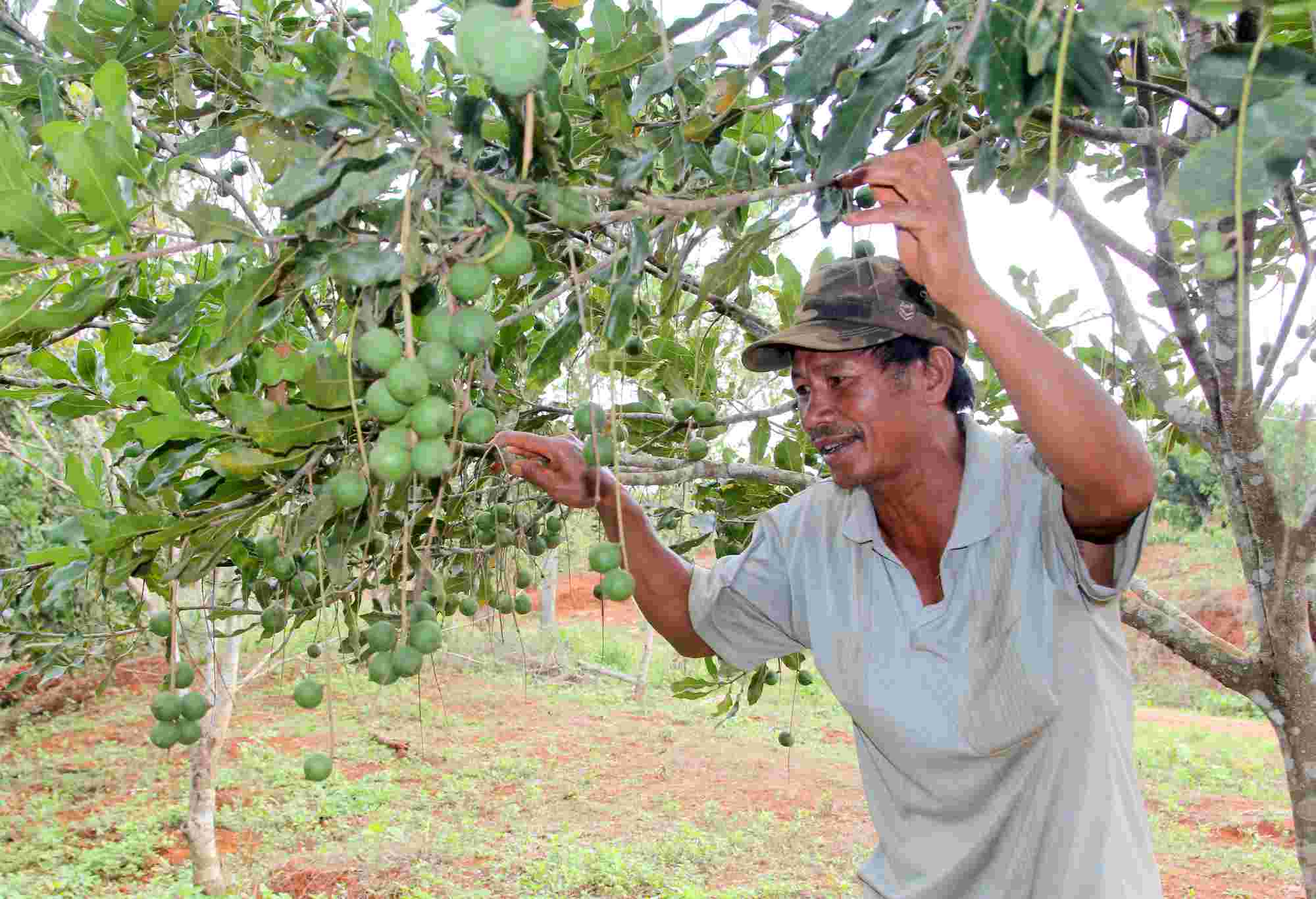Applying modern irrigation technology
According to the Department of Agriculture and Environment of Dak Nong province, the whole province currently has 3,200 hectares using economical irrigation systems, mainly concentrated in Dak Mil (900ha), Dak Glong (700ha), Dak Song (450ha) and Gia Nghia (400ha).
For example, the durian garden of Mr. Bui Quoc Viet in Dak Nia commune, Gia Nghia city with about 1,000 pure crops and an automatic rainwater spraying system combined with fertilizer through pipes.
The system helps maintain humidity, provide effective nutrition, save water and reduce labor costs.
In addition, Mr. Viet also grows herbs to keep moisture, prevent erosion, protect the soil ecosystem and increase sustainability. Thanks to the application of automatic irrigation, operating costs are reduced, durian productivity and quality are improved.
Currently, Mr. Viet's durian garden has met VietGAP standards, a product that meets export standards with stable output and good prices.
"water and manure are provided at the right time, in the right amount, without waste, only need one operator", Mr. Viet shared.
Regarding solutions to respond to droughts and climate change, Standing Vice Chairman of Dak Nong Provincial People's Committee Le Trong Yen requested the agricultural sector and people to strengthen and replicate advanced irrigation models and water-saving irrigation.
The application of advanced irrigation systems and modern technology will help farmers easily produce agriculture according to standards, forming large raw material areas for processing and export.

Converting crops to prevent drought
Mr. Dieu Pem, in Quang Truc commune, Tuy Duc district, previously cultivated 3 hectares of coffee.
In 2012, in response to the policy of introducing macadamia trees to be planted to develop the economy and adapt to climate change, he intercropped nearly 700 macadamia trees in his coffee garden.
According to Mr. Dieu Pem, macadamia trees are easy to care for, consume less water and fertilizer. In the dry season, when watering coffee, he only needs to add a small amount of water for the macadamia, thereby significantly reducing care costs.
Currently, the macadamia garden produces about 4 tons of fresh fruit per year. With a selling price of 80,000 VND/kg, he earned more than 300 million VND.
Faced with the increasingly severe impact of climate change, the Dak Nong Provincial People's Committee has issued a plan to convert crop structure for the period 2022-2025, with a vision to 2030.
According to the plan, by 2030, the province plans to convert more than 8,557 hectares of land for growing key crops such as coffee, pepper, rubber, cashew, etc.
If these crops are no longer suitable or low in efficiency, they will be converted to potential crops, better adapting to local conditions.
From 2022 to present, the plan has been implemented in practice. In 2024 alone, Dak Nong has converted more than 1,615 hectares, reaching more than 65% of the annual plan. Primary alternative crops include macadamia, pepper, fruit trees, cocoa...
Of which, more than 532 hectares of coffee have been converted to macadamia, pepper, cashew, durian, orange, tangerine... in Dak Mil, Dak R'lap and Dak Glong.
About 274 hectares of pepper have been replaced with coffee, durian, avocado, jackfruit. More than 368 hectares of ineffective crops have been converted to coffee, macadamia, durian, and avocado, mainly in Krong No, Dak R'lap, Dak Glong and Gia Nghia city.
More than 440 hectares of rubber have been converted to macadamia, coffee, pepper and fruit trees, concentrated in Tuy Duc, Dak R'lap, Dak Mil and Krong No.
Permanent Vice Chairman of the Provincial People's Committee Le Trong Yen said that every year, the province develops a specific plan for converting crop structure to respond to climate change, especially drought. The conversion is based on agricultural planning and conditions of each region.
The province prioritizes research and selection of plant varieties with high productivity, high quality, and good adaptation to the climate. The province also built a concentrated raw material area, developed a production - consumption chain, promoted the brand and expanded export markets.
In particular, Dak Nong is also studying and supplementing policies to support people in the transformation process, associated with the development of concentrated production areas, applying high technology to agriculture.
